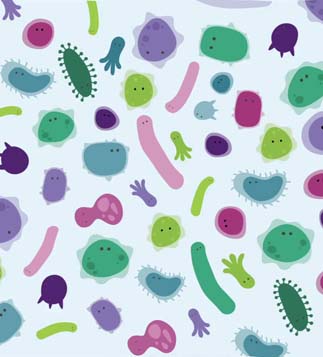Defective Celiac Microbiome Could be Rectified with Tryptophan & Probiotics
 Intestinal microbiota of celiac patients display a defect in the production of active compounds that result from the breakdown of tryptophan by microorganisms. A dietary intake of tryptophan or supplementation with probiotics that can metabolize this amino acid diminish the intestinal lesions of celiac disease in animals and offer new therapeutic prospects in humans.
Intestinal microbiota of celiac patients display a defect in the production of active compounds that result from the breakdown of tryptophan by microorganisms. A dietary intake of tryptophan or supplementation with probiotics that can metabolize this amino acid diminish the intestinal lesions of celiac disease in animals and offer new therapeutic prospects in humans.
- Reviewed by Emily Henderson, B.Sc, News-Medical.net 1
Celiac disease is an immune disease of the intestine that affects more than 1% of the population. It is characterized by gluten intolerance that causes inflammation of the gut, abdominal pain and diarrhoea, and can lead to weight loss and deficiencies among patients.
An international research consortium involving teams from McMaster University (Canada), INRAE, Sorbonne University Paris, INSERM, Paris Public Hospitals (AP-HP) and Wageningen University (Netherlands) has shown that
- the intestinal microbiota of celiac patients displays a defect in the production of active compounds that result from the breakdown of tryptophan by microorganisms.
Their findings, published on 21 October in Science Translational Medicine, show that
- a dietary intake of tryptophan or supplementation with probiotics that can metabolize this amino acid diminish the intestinal lesions of celiac disease in animals and offer new therapeutic prospects in humans.
Celiac disease is characterized by an intolerance of gluten, a protein that is widely present in our diet and notably in certain cereals such as wheat. Patients who suffer from this disease need to follow a strict and restrictive diet designed to exclude gluten and thus improve their symptoms. Several factors are involved in triggering this disease and they are notably genetic and immune.
Because the disease is characterized by inflammation of the gut, the scientists decided to look at the role of the gut microbiota. In healthy subjects, some bacteria in the microbiota specifically utilize tryptophan (an amino acid found in the diet) to produce new compounds called indole derivatives that activate AhR (Aryl hydrocarbon Receptors) present on cells in the intestine.
Activation of these receptors generates beneficial effects such as reinforcing the intestinal barrier or stimulating immunity, which then attenuate gut inflammation and preserve the balance of the gut microbiota. In other inflammatory intestinal diseases (Crohn’s disease and ulcerative colitis) the research team had previously demonstrated changes to the microbiota, and particularly a defect in the production of these tryptophan derivatives and hence a reduction in AhR activation.
Defective tryptophan metabolism in celiac disease
The scientists analyzed stool samples from a cohort of 29 patients – who were either suffering from active celiac disease or had the disease and had been treated for 2 years with a gluten-free diet – and from healthy volunteers without celiac disease.
Their results revealed that in patients with active celiac disease it was only possible to detect a reduced quantity of tryptophan indole derivatives and a diminished activation of AhR. As well as inflammation, the team also observed changes to the intestinal microbiota which resulted in fewer microorganisms metabolizing tryptophan and producing the indole derivatives necessary to activate AhR.
An intake of tryptophan and probiotics to improve the symptoms of celiac disease
In model mice developing a condition similar to celiac disease, the scientists modulated the diet in two ways: they either administered an additional intake of tryptophan (which is usually found in protein foods such as meat, liver, poultry, fish, dairy products, dried fruits, soybean, etc.) or they gave them the probiotic bacterium Lactobacillus reuteri which produces indole derivatives from tryptophan.
Their findings showed that a tryptophan-enriched diet caused changes to the microbiota of these animals, characterized by an increase in the microorganisms producing indole derivatives that activated AhR. When the mice were exposed to gluten, the intestinal inflammation of those given a tryptophan-enriched diet was reduced when compared to those receiving a standard diet.
The same results were observed among rodents which received the Lactobacillus reuteri probiotic. In addition, the tryptophan-enriched diet or the probiotic bacterium enabled significant improvements to the celiac disease lesions in mice when they were exposed to gluten.
- This study opens new therapeutic prospects for patients with celiac disease whose only treatment at present is a strict and restrictive gluten-free diet.
A patent has been filed by McMaster University and INRAE together with Sorbonne University, INSERM and AP-HP, in order to protect a therapeutic approach based on modulating the activation of AhR using a tryptophan-rich diet and probiotics in order to treat celiac disease.
- Further studies are now necessary to confirm these findings in humans, but this new therapeutic option would enable improvements to the symptoms and quality of life of patients with celiac disease.
Probiotics contain living micro-organisms (bacteria, yeasts, etc.) that exert a beneficial effect on the person ingesting them.
Journal reference: Lamas, B., et al. (2020) Aryl hydrocarbon receptor ligand production by the gut microbiota is decreased in celiac disease leading to intestinal inflammation. doi.org/10.1126/scitranslmed.aba0624.













